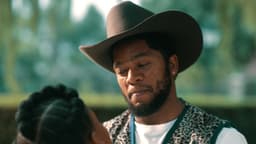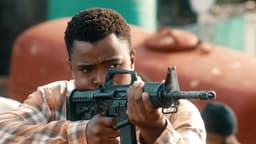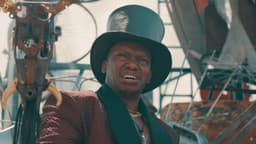
Senegalese-born Nicolas Jackson on how football has changed his life
Showmax chatted to Senegalese-born Chelsea striker Nicolas Jackson. The striker has been at the forefront of Chelsea’s fine form, and could be the difference in their chase for a Champions League spot.

Tell us a little bit about your background and your personal life growing up?
I'm obviously Senegalese, but Senegalese and Gambian because my dad is Gambian and I went to Gambia when I was young. When you're young, normally in Africa, you always go to your dad's place, you know? And so, I went to my dad's home, and then I went back home to Senegal when I was maybe 14 ,15, to be with my mum again.
Tell me about your mom. Did she work on a farm? What role did she play in your love for football?
I don't think my mom loved football. My mom didn't care what I was doing, she just wanted me to be successful and do what I want to do. So it's not like she forced me to play football, she just wanted me to be happy and do what I want, but do the right thing, not something bad. She was working on the farm. She's always working. Not just her, everybody in Senegal loves that. All the mothers go to the farm or they sell, so, it was normal.
Why did you decide to pursue football?

It's difficult to choose, so you just have to do what you want to do and try to go with it 100%. So I did football and then decided I'm just going to play, and I went all out in training every day. And then I went to the teams and I played street football when I was young, of course. I started off in first division, then went to Villareal and now I am at Chelsea.
Tell me a bit more about street football because, you know, you're a Premier League footballer now, life is very glamorous, but not too many years ago you didn't even have a pair of football boots.
We didn't have original boots because it's too expensive, so normally I played with my school shoes or barefoot because my family didn't want me to play. It’s not that they didn't want me to play. They didn't just want me to waste my time playing football because it's too difficult to be successful in football in Senegal. You have to be very talented or lucky to go. Maybe two players leave in 10 years or two players leave in five years. So it's not that they didn’t want me to play, it’s just they didn't want me to waste my time playing. So, they said, no, don't play, just study, study, study, study. So I was always studying.
You must have had incredible belief because you just said only one or two make it out and your family wanted you to study. How did you know you were going to be one of those who made it big?
I knew since I was young. My dad asked me when I was about four or five, what I want to be in the future and I said, a football player. He told me it was difficult to succeed. I knew I had to work very hard and I wasn't scared of being successful.
You played at school. You played in the streets. Then your first taste of organised football is with ASC Tilene. What was that experience like?
It was difficult, especially when I came to Spain because I didn't have that experience. I was just running and playing with the ball and dribbling a lot. In Spain, they tried to teach me where to stand, I was like, bro, just let me play. And then I understood more. So, it's like three years of trying to learn tactics and try to run behind.
Let's go back to going to Casa Sport because you earned a nickname there. I think in the first game people saw you and called you Neymar.
Yeah, it was in Tilene, they called me Neymar, because I just loved dribbling. I was trying to do what he does, many things on the pitch.
You moved to a new continent, a new country in Spain, and had to learn a new language. How did you adapt?
It was difficult because I didn't speak the language, but obviously I was living with other people, and 'm not a quiet person. I like to socialise with the people, so, I was learning. I learned Spanish quickly. In six, seven months, I was good. Speaking Spanish, or at least trying to because no one spoke English. Only one guy. So I had to speak Spanish. But it was nice living in Villarreal. I was living in Ciudad Deportiva, so there I was learning Spanish and then I moved to the house and then I went on loan to Mirandes then came back to Villareal’s B-team, and then eventually into the first team.
That loan deal that you mentioned. How did that affect you mentally? Did it make you more determined to make it work to prove yourself?
Yeah, I think it helped me a lot because that time I was in the under-19 team and then I think Mirande was in second division, so they took me from there. I had a hamstring injury so I went there. I had to recover from my hamstring injury and start playing. I went there and I played a lot of games when I started and when it was cold, I started to get injured again, so I had to come back to Villarreal. When I came back I got put in the B-team and that made me angry. But I told myself, look, I’m not ready. I showed that I'm not ready yet to be in the first team, so I have to stay one year more in the B-team and then try to prove myself and go to the first team.
So I tried and changed everything around me, try to improve everything, food and people around me as well. And, that year we did amazingly and we went to second division. And then Unai Emery took me to the first division that year, to the first team, and then I was starting every game.
What was it about that year when you were in the B-team? What did you do besides change things around you?
When you are not injured, you get more confident in your legs and run better. So, I changed everything around me. And then I was feeling better.
And then Unai saw you, took you to the first team. What was it like working with him?
It was amazing. He taught me maybe 50% of what I know tactically. And because he is top tier, he changed everything. I used to play like a kid, but he got me playing like a man.
How much of that street football or, you know, the rough diamond do we still see in your play today?
It's a different me. I don't even see anything of when I was young. Now I play to win. It's different. Now it’s professional, you play to win, not play to have fun. You know if it's playing to have fun you can just play outside in the street. But now we play to win. So that's what I didn't know before. And I know that football now is about winning.
I hear that you were very willing to learn. Was that just because you wanted to make it to the top? Are you very open to learning in order to be the best?
I’m open to learning from people I know want to help me. Not everybody, you know. But I'm stubborn as well. So I like to listen to people that want to help me. But the pressure is it's normal because when you're in a big team and you want to be the best, if you cannot handle the pressure, I think you should not play football because football is all about that, because they don't know what you're doing off the pitch. They just know what you're doing on the pitch so they don't care what you're doing off the pitch. So, you just have to handle the pressure and try to play football and enjoy it and try to win.
How did your move to Chelsea come about?

I was playing well at Villareal and scored 12 goals that year. After the season I was going on holiday. I told my agent, I don't want to talk about any club now, I just want to enjoy myself please.
But there was interest from a few clubs, I think some teams in Milan. But one day my agent just calls me and tells me we are going to Chelsea. I said, oh, good. He said, but there is too much pressure. I said, don't worry, If I was not ready I would tell you. But I know I am ready for that level.
I was ready to face the pressure, but I think even my friends were saying, oh, don't go to Chelsea. I think some people in the national team told me, no, don't go because there is too much pressure. I said, bro, but we're different, you know?
It sounds like that stubbornness you were talking about because you just knew you were going to make it at Chelsea?
I haven’t made it yet. I'm just improving. I haven’t made it yet. You are making it when you are starting every week, every year, scoring 30 goals or something. Like winning, winning something, you know?
Your start was very difficult at Chelsea though, wasn’t it?
It was very difficult, but nothing is easy in life, but it's different now though.
I don't mind the difficulties and challenges. Also, the more I hear people saying bad things about me, the more it drives me. You know, criticising me. I just love this.
Do you feel you settled in at Chelsea now?
I’m feeling good. Very good. With the players, with the coach, when they're playing. And there's no pressure it means, you are doing well. I am just trying to focus and work harder.
As an African goal scorer playing for Chelsea, the comparison that was inevitable was you and Didier Drogba. Do you feel it? How do you feel about it?
I don't compare myself with anyone, because I haven't reached the level of a Drogba as yet.
Didier is like a legend in Africa and a legend in Chelsea. He won everything. I haven't won nothing yet. I haven't done nothing yet. So, I don't really like the comparison, but it's nice. It means you're heading somewhere, and you just try to work harder to be like him or more than him.
What is it like representing the Senegal national team? In the last international break you scored your first goal. What was that feeling like?
I was very happy because it was my first goal there, and my only goal right now. When I joined the national team, there was big names, so you have to settle down. It's not easy there, you know? So, I was very happy to score. And seeing those big players celebrate with me like Sadio Mane, was special. I think I watched Mane from when I was a young boy.
You do charity work in Senegal. Can you tell me a little bit more about that. How much it means to you, why it's important to, you?
I’m not just working for myself. I’m working, of course, for myself, for my family, for the people that I grew up with, my friends. So, it's nice when you do this kind of thing and know if I had that before, it would be better, but I didn't have it. So if I have it, it's nothing, it's just, you know, a little something that every month I try to give to the people what they need, like food,
I give boots as well to the to the boys. I try to take the boots off the players here and some I buy. Some I take from Nike and try to give to the kids in Ziguinchor [in Senegal]. So not everybody will have, but a few would.
You struggled in the beginning at Chelsea and now you've made it. You said you haven't done anything yet. What are your hopes and ambitions and dreams for the future?
I have personal dreams. I have it in my mind. Maybe when I finish football, I'll talk about it, you know.
But from a football point of view? Obviously, every year, win a trophy, be the best in the world. And that's obviously since I was young, that's what I was, why I play football to win trophies and be the best goal scorer.
What about the manager Enzo Maresca, how he's adapted to what he wants, how he's helped you?

He's amazing because he was obviously last year with Leicester and he has been at Man City. So he has a lot of experience in helping all the players, bringing new ideas to the play, and helping the team a lot and he has a winning mentality and ambition too. He is also a very amazing person. So, we're very happy to work with him and I hope we do amazing things together. We travel together and have many happy moments together in Chelsea.
Have you set any immediate targets for this season? Like a certain number of goals you want to score?
Not me personally, my brain is always okay, so that's not for sharing.
How can fans get Showmax Premier League on their phones?
Sign up for the Showmax Premier League mobile plan for R69 p/m at www.showmax.com for all the Premier League action.
More like this

From Poverty to Purpose: The Redemption of Emmanuel Adebayor: Why Saving Lives Trumps Scoring Goals
Emmanuel Adebayor's life story is one of miracles and staggering perseverance, beginning in abject poverty that few can comprehend.

Manchester City vs Liverpool: The Rivalry Reignites
Catch the thrilling encounter between Manchester City and Premier League champions Liverpool live on Showmax Premier League on Suynday at 18:30 (SAST)

Can LFC rediscover the form that saw them crowned champions?
A thrilling line-up of games await football fans in the Premier League this weekend. Catch all the action live on Showmax Premier League.

Conor Bradley on Liverpool's difficult run and the path back
Conor Bradley opens up on LFC's recent struggles. Catch the Reds in action against Brentford live on Saturday at 9pm on Showmax Premier League.

Showmax Premier League weekly watchlist: 18-23 February
Stream every Premier League and PSL game on your mobile device live on Showmax Premier League.

Bafana Bafana composed for Durban showdown against Zimbabwe
Bafana Bafana take on Zimbabwe at Moses Mabhida Stadium on Friday, 10 October, in a must-win FIFA World Cup Qualifier. Live on Showmax Premier League.

Arsenal and Liverpool early front-runners ahead of Premier League international break
Arsenal looks sharp, Liverpool looks hungry. Who’ll keep it going after the international break? Watch live on Showmax Premier League.

The Premier League canvas: a Saturday masterpiece painted in blue and red
Catch all the action from the Chelsea v Liverpool game live on Showmax Premier League on Saturday, 4 October at 18:30.
Outlaws, now streaming on Showmax
Go on holiday with RHUGT: Africa
More Showmax Originals you'll love

Jojo on The Real Housewives Ultimate Girls Trip: Africa reunion, social media backlash and more
Jojo opens up about the highly anticipated reunion for The Real Housewives Ultimate Girls Trip: Africa, coming to Showmax on 20 and 27 February.

MaBlerh to host the first-ever The Real Housewives Ultimate Girls Trip: Africa reunion
MaBlerh will host the first-ever reunion for The Real Housewives Ultimate Girls Trip: Africa, set to air in two parts in February 2026.

Nhlanhla Kunene confirmed for Law, Love and Betrayal Season 2
See Nhlanhla Kunene in Law, Love and Betrayal Season 2 as Mondli Gumede, from 8PM on 8 March on Mzansi Magic, and streaming from 9 March on Showmax.

Christall dishes on The Real Housewives Ultimate Girls Trip
Christall Kay on the drama of The Real Housewives Ultimate Girls Trip: Africa, and what it was like to reunite with Evodia. All episodes on Showmax.
Latest Stories

Schalk Bezuidenhout trades stand-up for 9-5 in Die Kantoor

A heartbreaking loss: Nolwandle Biyela’s final stand in Outlaws Season 2

Fall in love with romantic drama Touch, now on Showmax

Antonie Marx on Volspoed and why it's a must-watch

Sandra Stein makes her debut on Law, Love and Betrayal S2

Albert Pretorius on Die Kantoor, SA’s re-imagining of The Office

20+ addictive South African reality shows to stream

Where to watch The Real Housewives franchise online

How to Train Your Dragon: Bringing Hiccup and Astrid to life

What to watch on Showmax in January 2026

7 things to know about indie award-winning movie Dìdi

Mission: Impossible – The Final Reckoning’s South African stunts

Die Kwiksilwers (2024)

Where to see the cast of Mpondoland on Showmax

Angel on The Real Housewives Ultimate Girls Trip, Jojo and more

Thandolwethu Zondi on his new role in Outlaws S2
Must-watch trailer for Showmax's turbo-charged reality series Volspoed

The Real Housewives Ultimate Girls Trip cast on first impressions, beefs and more

Fana Mokoena on playing a sangoma in Masinga

Princess Jecoco on The Real Housewives Ultimate Girls Trip Africa

Tlali returns: Outlaws’ most loved and hated villain is back

Novocaine: the US box office hit shot in Cape Town

Why Jackie Phamotse says Slay Queens is a must-watch

Evodia on Ultimate Girls Trip Africa and her return to reality TV







